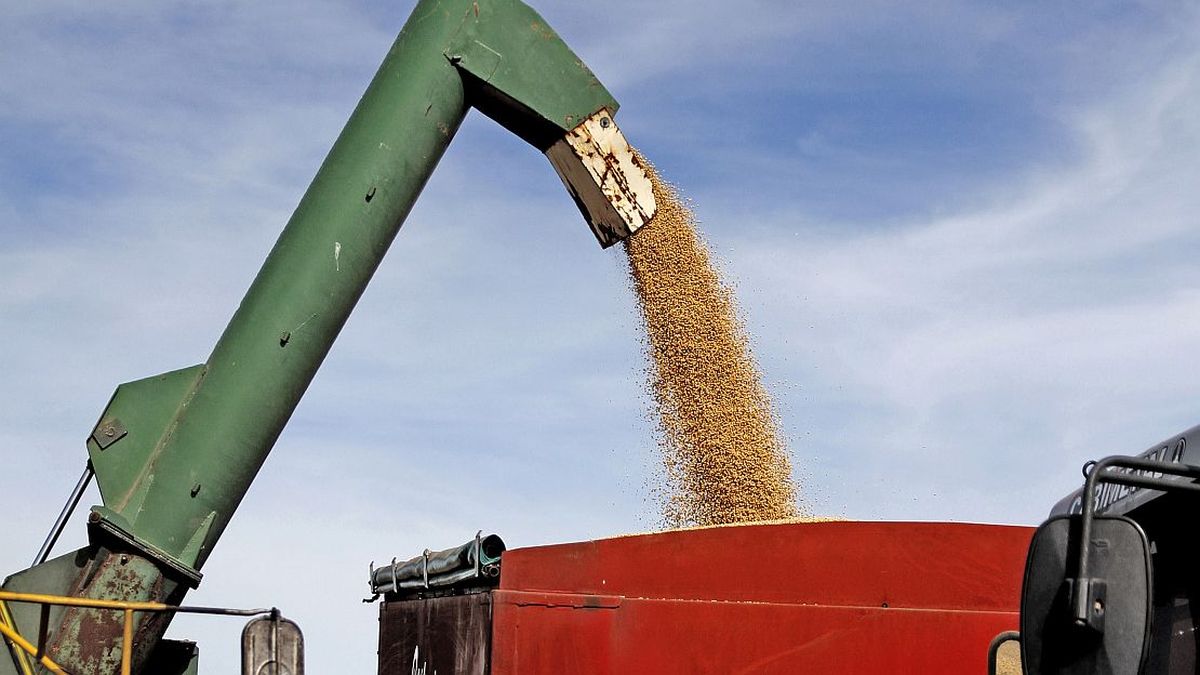Massa announced that an agreement had been reached with the agro-exporters by which 5,000 million dollars will enter in the current month – about 1,000 million dollars in the next 72 hours.
The new mechanism establishes a lateral round of the Single Free Exchange Market, transitory for 25 days that begins on Monday and ends on September 30.
The minister announced that the Necessity and Emergencies Decree that will implement the measure will contemplate that the producers that adhere will be able to continue participating in new benefit programs that the authorities will carry out.
Massa clarified that the decision constitutes “a simple measure for the producersince you can look at the blackboard price in the Rosario Stock Exchange, you charge in your account and you can choose to use the resources to buy supplies or use the chacarero account or link account in all banks”.
He also specified that “in net terms it represents the same as if they were zero retentions for the producer.”
It was also announced that the higher revenues generated by this mechanism due to exchange appreciation allow two programs to be carried out. One referred to strengthening for all regional economies to find mechanisms to increase exports based on better prices and aid and compensation for regional economies.
And another through ANSES of helps the most vulnerable sectors “understanding that this effort made by the State paying a higher price has a social correlate to offset the problem of inflation”.
Meeting
Before the announcements, a meeting was held with the participation of officials and sector representatives. The secretaries of Economic Policy, Gabriel Rubinsteinof Agriculture, John Joseph BahiloTreasury, Raul Rigoof production, Jose Ignacio De Mendiguren Development Planning and Federal Competitiveness, George Neme and of Commerce, Matias Tombolini.
Also present were Marco Lavagna, head of INDEC, the president and vice president of the Central Bank, Miguel Pesce and Lisandro Cleri, in that order, the Chief of Advisors of the Palacio de Hacienda, Leonardo Madcur, Jorge Solmiof the Federal Operational Coordination Unit, William Michaelhead of the General Directorate of Customs and Gabriel Viennichief of staff of the Secretariat for Industry and Productive Development.
The private sector participated John Joseph Blanchard (President DREYFUS), Robert Urquia (Chairman of General Deheza Oil Group), Vladimir Barisic (President VITERRA), Alfonso Romero (COFCO President), Gustavo Idigoras (CIARA CEC President), Jose Castelli (BUNGE President), Fernando Cozzi (President CARGILL), Paul Noceda (President of Molinos Agro), Joseph Martins (Chairman of the Bs. As. Cereal Exchange), Javier Cervio (Executive Director of the Rosario Stock Exchange), Maximilian Abraham (Chairman of the Bahía Blanca Cereals and Products Exchange), Analia Gaviglio (Santa Fe Cereal Exchange), Diego Mayer (President Cereal Exchange of Entre Ríos), Juan Carlos Martinez (President of the Córdoba Cereal Exchange), Julian Echazarreta (Argentine Cooperative Association), Mariano Rodriguez (AFA SCL), Ernest Crinigan (Chairman Center for Brokers and Agents of the Bs. As. Cereals Exchange), Luciano Durand (Cereal Corridors Center of Rosario), Ferdinand Rivara (President Federation of Collectors of Argentina), Andres Ponte (President MATBA ROFEX), Alfredo Passeyro (President of the Argentine Seed Growers Association) and Antonio Aracre (CEO of SYNGENTA). he was also Paul Ansalonipresident of the Social Work of Rural Workers of the Argentine Republic
Negotiation
Throughout the week the Minister of Economy, Sergio Massa and his Secretary of Agriculture held meetings with the representatives of agriculture.
With these announcements, this Monday the head of the Treasury Palace will leave for Washington to hold meetings with the International Monetary Fund, the United States Treasury, the Inter-American Development Bank, the World Bank, investors, among other meetings.
One of the most critical points of the agreement with the IMF is precisely the level of foreign currency reserves. For this reason, it was key for the economic team to get the sectors that “manufacture dollars” to increase liquidations.
It should be noted that on Thursday the board of the Central Bank decided not to renew the mechanism known as the “soybean dollar” according to Ámbito advance.
The initiative that had the purpose of promoting the sale of soybeans is known as the 70/30 account. According to data from the sector, the measure did not demand greater interest on the part of the producers since since its announcement to date, the operations represented some $2,600 million, that is, less than USD 20 million.
This measure, which became known at the end of last July, allowed producers to place 70% of the value of what was sold in a fixed term that had a kind of exchange insurance. On the other hand, they could allocate the remaining 30% to acquire a solidarity dollar.
However, there were implementation problems, such as, for example, that numerous banks did not know how to carry out the accounts, complicating their acceptance, among other factors.
For its part, the Chamber of the Oil Industry of the Argentine Republic (CIARA) and the Cereal Exporters Center (CEC) reported that during August, companies in the sector settled more than 3 billion dollars, that is, 5% more than in July, and 11% above August 2021. Precisely the foreign currency income in August constitutes the most in the last 20 years.
The amount settled to date is almost US$26 billion (US$25,696,907,401, 10% above last year.
The entities, on the other hand, indicate that “there are no delays in the settlement of foreign exchange.”
Source: Ambito
David William is a talented author who has made a name for himself in the world of writing. He is a professional author who writes on a wide range of topics, from general interest to opinion news. David is currently working as a writer at 24 hours worlds where he brings his unique perspective and in-depth research to his articles, making them both informative and engaging.




